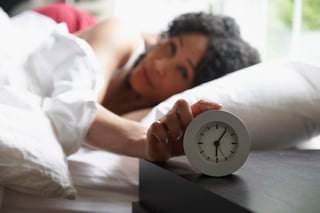9 Ways to Ease Transition & Increase Productivity After a Night Shift
As a healthcare provider, you have probably experienced the toll that the night shift can have on your quality of life.
 Working the night shift forces the body to operate counter to its circadian rhythm, the internal clock that tells us when we should be sleeping and when we should be awake. Few people adapt easily or completely to such schedules, and it's not uncommon for such people to suffer from shift work sleep disorder (SWSD) or experience burnout in their career.
Working the night shift forces the body to operate counter to its circadian rhythm, the internal clock that tells us when we should be sleeping and when we should be awake. Few people adapt easily or completely to such schedules, and it's not uncommon for such people to suffer from shift work sleep disorder (SWSD) or experience burnout in their career.
People who work the night shift can experience a variety of sleep-related issues, including insomnia, excessive sleepiness, irritability, and lack of concentration. Long-term effects also include depression, anxiety, substance abuse, and other mood disorders.
As a healthcare provider working in the field of emergency medicine, your schedule doesn't lock you in with what's natural for your body. Working nights, whether exclusively or sporaticly, is a part of the job and there will be times you are faced with working them.
How can you ease the transition and increase your productivity after working a night shift? Here are 9 hacks for optimizing that valuable time as the sun rises and you head to bed.
1. Shift Slowly
Any changes to your circadian rhythm should be made gradually. It takes at least two days, and up to a week, to adjust to a major shift in schedule. As a healthcare provider, it is important that your scheduling department recognizes this and doesn't schedule you for a day shift too soon after a night shift.
The scheduling department at EMrecruits works with each of our client partner groups to establish scheduling guidelines that take this into consideration. Specific guidelines and considerations vary from client to client, however the general consensus is that a provider would need somewhere between 36 to 72 hours to recover after a night shift before they could return to the emergency department for a day shift.
2. Resist Caffeine
The quick boost caffeine gives you is likely to raise your sleep deficit. Shift workers who rely on caffeine have more trouble getting to sleep after work. Some alternatives include:
- Ice Cold Water and B12: Ice cold water first thing in the morning can shock your system into a metabolic furnace that kicks into gear to warm the water put into your system. Combined with vitamin B12, this is an excellent way to jump start your engine. B12 is known for its mental clarity and energy enhancing properties.
- Sounds crazy, but maybe crazy enough to work! Stretching upon rising catapults oxygen metabolism in the blood, sending oxygen rich cells to the muscles and the brain, which sparks an alert and focused body. Combine this with a fresh apple and you can boost your system into a similar caffeine wakefulness. The act of chewing an apple opens up neural and muscle pathways, and the fructose sparks the metabolism into energy production.
3. Avoid Exercising Immediately Before Bed
According to the National Sleep Foundation, exercising upon waking or mid-day can help you fall asleep faster and then sleep more deeply once you do fall asleep. Regular aerobic exercise has been proven to improve sleep quality and leads to fewer depressive symptoms, more vitality, and less sleepiness during the daytime.
Know your schedule and plan your exercise accordingly to match. Avoid getting off the night shift and heading to the gym if you plan to hit the bed once you get home, as vigorous exercise immediately before bedtime can actually reverse those good effects.
4. Avoid Eating Heavy Meals Within 2-3 Hours of Bedtime
We know it's tempting. You get home after a 8, 10, or 12-hour shift and want nothing more than to eat a big meal. Some studies have shown that food is processes differently at different parts of the day, so if you plan to head to bed within two to three hours a better choice would be a high-carb, low-protein snack (under 250 calories). Otherwise your body will be busy trying to process those calories rather than resting. Cheese and crackers, or even a bowl of oatmeal would be great choices.
5. Set Your Alarm in Multiples of 90 Minutes
I've actually put this tip into practice myself and have seen the benefits...
As mentioned earlier, we all have circadian biological rhythms that regulate the timing of periods of sleepiness and wakefulness throughout the day -- and also periods of deep and light sleep. Every 90 minutes that you're asleep, you go through two periods of REM sleep, separated by one period of non-REM sleep.
So, to get the most out of your sleep time and be the most comfortably alert when you wake up, you'll want to sleep for multiples of 90 minutes.
"Studies show that the length of sleep is not what causes us to be refreshed upon waking,writes the folks at the Center for Applied Cognitive Studies. "The key factor is the number of complete sleep cycles we enjoy."
In other words, someone who only sleeps for four 90-minute cycles (six hours total) will actually feel more rested than someone who's slept for eight hours.
6. Develop a Regular Sleeping Pattern
Your home life makes a huge difference when it comes to getting enough sleep. You need the support of those you live with, so that you can successfully manage kids, bills, and other priorities – not to mention having quality family time – without being robbed of rest.
Developing a regular sleeping pattern on and off night shifts will help you find it easier to both fall asleep and wake up. Also doing the same activities before bed has been shown to signal your body that it's time to fall asleep. Sleep is a skill and you have to be really savvy about where and how you sleep. Have a planned sleep period, and a very dark and quiet room at your disposal.
Also, you have to be smart about the amount of sleep you get. The number of hours you need to sleep varies from person to person. Why? It has to do with your "chronotype," -- your natural tendency to be sleepier and more awake at certain times of day. It also affects when and for how long you need to sleep. Start a sleep diary to determine when and how much sleep you feel best at and then stick to it.
7. Don't Check Your Phone Before Going to Sleep
Here's one most of us are guilty of: Checking our phones (or tablets, or computers) right before hitting the hay. But studies have shown that people who stare at a backlit screen right before bed report lower-quality sleep -- even when they get just as much sleep as someone who didn't look at their electronics before bed.
Why? Because the presence and absence of light tell our brains whether or not they should release the sleep hormone melatonin that makes you tired, according to the National Sleep Foundation. The LED lighting emitted by the screens on our electronic devices is similar to daylight, which can trick our brains -- making us stay away for longer and disrupt our sleeping patterns.
By unplugging during the 30-60 minutes before bed, we're priming our brains for sleep much better -- which leads to better quality sleep and a happier time waking up.
8. Let there be Light
Turning off your electronics before you go to bed so you aren't staring at light in the darkness helps tell your brain the get ready for bed. Likewise, waking up in the light helps wake up your brain. Again, we all have our own circadian rhythms -- and these rhythms are deeply influenced by the presence and absence of light.
Try an artificial sun lamp, like this one from Philips. Some of them are connected to alarm clocks that get gradually lighter and lighter as you approach your wake-up time, making you less groggy when your alarm finally goes off.
9. Eat a Nutritious Breakfast
Why do so many people skip breakfast? Oftentimes, it's because they don't have enough time to eat it, or at least to make it nutritious. But depriving yourself of food altogether or rushing to an appointment with a bagel-to-go isn't going to give you the energy you need to stay focused at work.
Take time to eat a healthy breakfast. Foods that boost productivity include eggs, bananas, yogurt, and blueberries.



